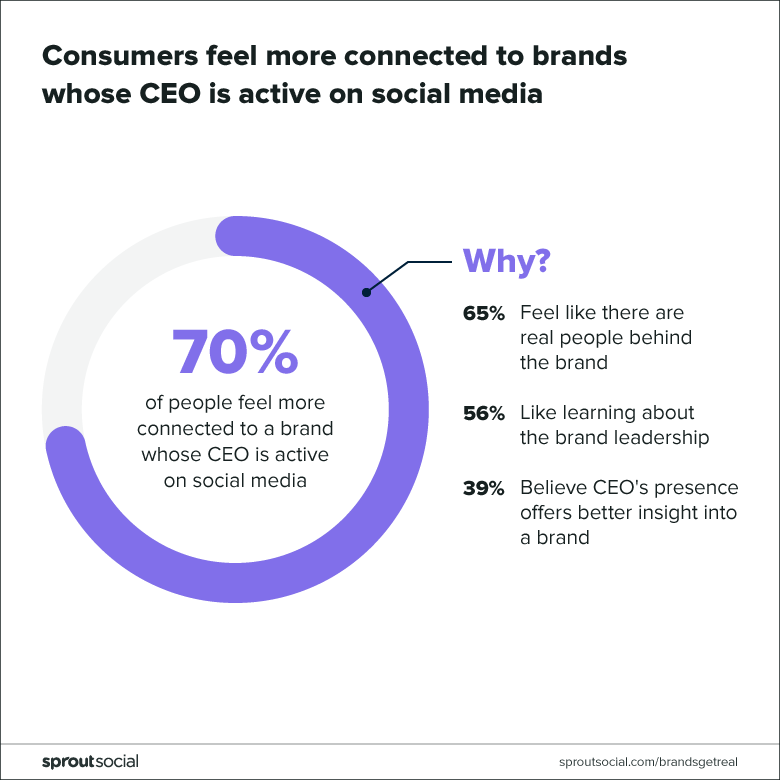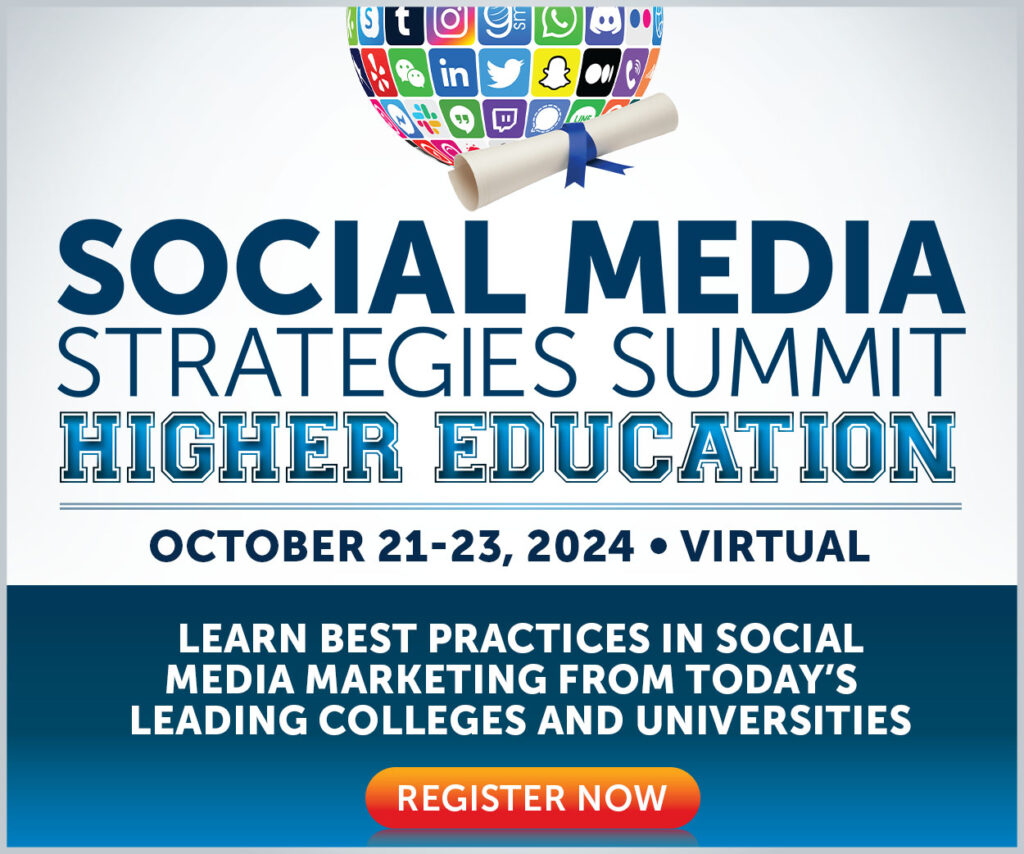It’s time for executive leaders in higher education to step out from their ivory towers.
Across all industries, there’s plenty of evidence about the benefits of people in leadership roles interacting with their audiences via social media.
For instance, research from Sprout Social discovered that 70% of consumers feel more connected to brands when the brand’s CEO is active on social platforms.
It makes brands look more human. It allows existing and prospective customers to learn more about the brand’s leadership. And it offers greater insight into the organization.
All of those factors are relevant to higher education institutions, which find themselves in an academic landscape that’s never been more competitive.
With that in mind, we’ve rounded up some of the best executive leadership social media profiles in higher ed, looking specifically at the platforms and approaches they use to reach audiences and drive engagement.
1. Andrew D. Martin, Chancellor, Washington University in St Louis
Profiles:
Andrew D. Martin is Washington University’s 15th chancellor, as well as an author and member of the American Academy of Arts & Sciences.
He has more than 6,200 followers on LinkedIn but posts more frequently on Twitter.
In particular, Dr. Martin is a big fan of sharing visual content, whether professionally taken photographs of the university at night:
Wonders never cease. pic.twitter.com/bI65lm3VbH
— Andrew D. Martin (@WashUChancellor) April 15, 2022
Or more rough-and-ready video footage from graduation day.
The #WashU22 Commencement after party is in full effect! Many thanks to our amazing organizers and volunteers for their hard work on this special day. pic.twitter.com/qHvHJ61u0a
— Andrew D. Martin (@WashUChancellor) May 20, 2022
His content demonstrates an important point.
It’s common knowledge that tweets get more attention from users when they contain visual content like images, gifs, and videos. Twitter’s figures show that video tweets generate 10X more engagements than tweets without video.
Dr. Martin shows that capturing video for social media doesn’t need to be a complex process involving lots of planning and expensive equipment.
2. Maria Zuber, Vice President for Research, MIT
Profiles:
Not only is Maria Zuber the first woman to lead a science department at the Massachusetts Institute of Technology, but she’s also the first to lead a NASA planetary mission.
So she’s got plenty of exciting stuff to share.
Her primary platform is Twitter, where she has more than 4,700 followers.
Unsurprisingly, Dr. Zuber posts heavily about science and space travel.
She also shares and retweets a lot of content from within the science niche. Her passion and excitement for the topic always shine through.
It is impossible to convey how relieved I am. Or how excited I am about the discoveries that lie ahead! Congrats #JWST team! https://t.co/irpPhDKtXe
— Maria Zuber (@maria_zuber) January 9, 2022
3. Renu Khator, Chancellor, University of Houston System
Profiles:
Renu Khator is the first female chancellor in Texas and the first Indian immigrant to lead a comprehensive research university in the US.
While she has a combined 14,500 followers across Instagram and LinkedIn, that pales in comparison to her Twitter following, which currently stands at more than 97,000 people.
Unlike many academics, Dr. Khator is happy to post about her personal life rather than keeping her social profiles “strictly business.”
She shares pictures of her family:
We, the Khator girls! pic.twitter.com/XFuFezFgQI
— Renu Khator (@UHpres) July 17, 2022
And as a talented artist, she also regularly posts images of her latest works:
Every canvas is a journey… I start with an idea and it evolves from there. This one was an abstract but then I felt like adding some life so here it is. pic.twitter.com/Zrw3xi8Ztp
— Renu Khator (@UHpres) July 31, 2022
To be clear, we’re not saying that every higher education leader should pick up a set of watercolors to boost their social following.
But a little personality can go a long way on social media because followers want to see more than a list of updates about what’s happening at the university. They can get that information elsewhere.
4. Santa Ono, President & Vice-Chancellor, University of British Columbia
Profiles:
Santa Ono is a molecular immunologist and a veteran academic, having held senior positions at the University of Cincinnati and Emory University before taking up his current role(s) at the University of British Columbia.
Dr. Ono is active across many social platforms, including Facebook, Instagram, LinkedIn, and Twitter.
You might wonder how he finds the time to post regularly across four different accounts while also running a university (not to mention handling all his other duties, including leading the University Climate Change Coalition).
The answer lies in sharing content across multiple platforms.
For instance, Dr. Ono shared this post about construction work at the university on both Instagram and Twitter:
View this post on Instagram
While you don’t want to duplicate absolutely everything, getting as many eyes on it as possible makes sense if you have a fantastic piece of content. And it’ll save you a bunch of time too.
5. Ángel Cabrera, President, Georgia Institute of Technology
Profiles:
Ángel Cabrera has been president of Georgia Tech since 2019 and previously held the presidency at George Mason University in Virginia.
Dr. Cabrera has more than 32,000 followers across LinkedIn and Twitter, although he posts far more frequently — often multiple times a day — on Twitter.
Unsurprisingly, he shares a lot of Georgia Tech-related news.
Notably, he doesn’t just retweet other people’s content or share links to articles. Instead, he goes out of his way to add value and say something unique when sharing articles:
The next great biotech startups from @GeorgiaTech and the other research universities in Georgia won’t need to go elsewhere to grow. We want them to stay right here! https://t.co/VWQ4uGY1Lw
— Ángel Cabrera (@CabreraAngel) August 18, 2022
Which gives his followers more incentive to engage with, read, and share that content.
6. Laurie Leshin, Vice President and Director of the Jet Propulsion Laboratory, California Institute of Technology
Profiles:
Laurie Leshin is a vice president at Caltech and was previously the first female president of Worcester Polytechnic Institute, one of the oldest private STEM universities in the US.
As if that wasn’t enough, she’s also director of NASA’s Jet Propulsion Laboratory, which is undoubtedly one of the world’s coolest job titles.
While you can find Dr. Leshin on LinkedIn, it’s clear that she focuses much more on her Twitter presence.
Unusually in the world of higher ed leadership, she’s not afraid to breathe a bit of color into her social activity, as demonstrated by her Twitter handle (@LaurieofMars).
Her Twitter banner image is also a world apart from a lot of senior academic leaders:
It speaks to her passion for women in STEM, but it’s also fun, which isn’t an easy combination to pull off.
Even more unusually, she’s happy to tweet about her personal life:
Finally off on a replanned-from-2020 trip abroad with my wonderful in-laws— their first time to Europe. Will try to model disconnection from work and relaxation — we all need it! Will try to take a social media break too. See you on the other side @twitter buds! #selfcare pic.twitter.com/AMssckTBdG
— Laurie Leshin (@LaurieofMars) August 7, 2022
Her online “personal brand” is bolder than most of her peers, making her posts much more engaging.
In short, despite her impressive professional achievements, she’s not afraid to present herself as a real person.
7. Kevin Guskiewicz, Chancellor, the University of North Carolina at Chapel Hill
Profiles:
Kevin Guskiewicz is a neuroscientist, concussion researcher, and current chancellor of the University of North Carolina at Chapel Hill.
He’s also something of an outlier among executive leaders in higher education because his social media presence isn’t limited to the “big two” platforms of LinkedIn and Twitter.
Dr. Guskiewicz is extremely active on Twitter, often posting multiple times daily.
However, it’s worth focusing on his Instagram profile because so few of his peers use it.
Typically, Dr. Guskiewicz’s posts speak directly to students at the university rather than fellow senior academics:
View this post on Instagram
By extension, this helps the University of North Carolina at Chapel Hill look like it genuinely cares about its student body and their experience at the university.
If you were a prospective student looking for a university, that’s what you want to see.
8. Kenneth Schultz, Senate Chair, Stanford University
Profiles:
Kenneth Schultz is a professor of political science at Stanford and the current chair of the university’s Faculty Senate.
He’s also something of a social media celebrity.
In part, that’s because he’s happy to be pretty outspoken on social, which is a rarity in academia. But it also helps that he isn’t afraid to bring a little humor to his tweets:
National Archives: I can’t believe we had to release a statement debunking some crazy Trump statement.
Clorox: Tell me about it.
— Ken Schultz (@KSchultz3580) August 13, 2022
Just look at those likes and retweets. That’s a genuine viral smash hit!
Schultz has a wide-ranging Twitter presence. Beyond sharing his thoughts on politics and current affairs, he regularly shares his photography. And he’s also happy to comment on the state of academia:
As we swing into syllabus season, I am again struck by how much demand there is for short, accessible articles that can be assigned to undergraduates and how little incentive there is to write those.
— Ken Schultz (@KSchultz3580) August 11, 2022
All in all, Schultz comes across as someone with diverse hobbies and interests, which makes him a highly engaging person to follow on social media.
9. Erika James, Dean at the Wharton School, University of Pennsylvania
Profiles:
Erika James is the first woman and first person of color to be named dean in the Wharton School’s history of 140+ years.
As such, she plays a vital role as a prominent female leader, spanning the academic and corporate worlds.
Dr. James has amassed more than 9,000 Twitter followers, but that pales in comparison to her LinkedIn profile, which more than 240,000 people follow.
That makes her the highest-profile executive leader on our list (at least, as far as social media is concerned).
She posts at least a couple of times a week, highlighting the Wharton School’s efforts to give young people a taste of business education.
Dr. James also adds elements of thought leadership to her content, sharing practical business guidance that demonstrates her expertise and adds real value for her followers:
Thought leadership can be a powerful tool.
According to LinkedIn, most decision-makers read thought leadership content for at least an hour per week, with 53% of marketers planning to increase the volume of thought leadership in their content strategies.
10. Dania Matos, Vice Chancellor for Equity & Inclusion, University of California, Berkeley
Profiles:
Dania Matos is a big name in diversity, equity, and inclusion (DEI).
She’s the University of California, Berkeley’s Vice Chancellor for Equity & Inclusion and named Top DEI Advocate by the National Diversity Council. She was also recognized as one of the Top 25 Women in Higher Education by Diverse: Issues in Higher Education Magazine.
Unsurprisingly, DEI is a big focus of her social media presence.
She frequently posts about the institution’s various diversity and equity-related initiatives and also regularly writes blogs on DEI subjects for the university’s website:
As with many of the other higher ed executive leaders highlighted in this article, the message here is clear. Writing passionately about your role and the topics that matter to you can raise your profile while also boosting the credibility and reputation of your institution.
Want to take your social media strategy to the next level? Sign up for our next social media strategy conference!
Here are some similar articles you might enjoy:
- 9 Inspiring Examples of Higher Education Institutions on Social Media
- Top 19 Social Media Listening Tools for Your Best Audience Insights
- SMSsummit Speaker Interview with Chelsey Holts of UNC Chapel Hill



 Image source
Image source Image source
Image source






